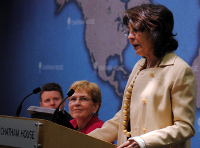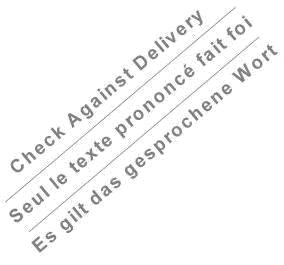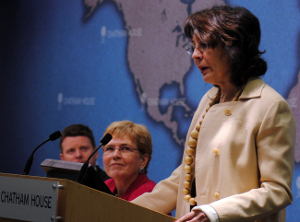Closing in on Illegal fishing

Eight International Forum on IUU Fishing
Chatham House, London, 11 February 2013
Commissioner Maria Damanaki is in London to participate as key speaker in the 8th International Forum on Illegal, Unreported and Unregulated (IUU) Fishing, organised by the Royal Institute of International Affairs. The Commissioner presented the latest achievements of the EU in tackling illegal fishing. At the conference, Commissioner Damanaki also discussed bilaterally with Mr Richard Benyon, Parliamentary Under-Secretary for Natural Environment and Fisheries, and Dr Jane Lubchenko, US Under Secretary of Commerce for Oceans and Atmosphere. Discussions focussed on the benefits of the close EU-USA co-operation so far against IUU fishing as well as on new areas of co-operation. These include cooperation on RFMOs (Regional Fisheries Management Organisations), Integrated Maritime Policy and the EU Atlantic strategy across the ocean especially in the areas of research, observation and mapping. On 12 February, Commissioner Damanaki meets the Global Oceans' Commission for a discussion on sustainable fisheries.

Ministers, ladies and gentlemen,
Many thanks to the organisers for their invitation to speak at this Eight International Forum on IUU fishing. I had the privilege to address this audience two years ago, in January 2011.
Back then, we discussed the first year of implementation of our IUU Regulation. I was not the only one to be enthusiastic and for good reasons. The EU had just managed to adopt an instrument based on the requirement for fish sold in the EU to be accompanied by catch certificates. The law also included numerous possibilities for challenging offenders, be they countries, vessels or individuals.
Please note that those rules are set out not by the European Union, but under international law: the EU IUU Regulation is essentially a procedural instrument, which allows enforcing substantive rules like the United Nation Convention on the Law of the Sea or the United Nations Fish Stock Agreement.
In the meanwhile we have started enforcement. The most notable step was made last November, when the Commission warned eight third countries that they will end up on a black list if they do not swiftly start cooperating in the fight against IUU fishing.
We had carefully investigated the compliance record of each of those countries. Even when taking into account the global level of development of the countries, there were strong indications that each of them was neglecting in particular its duties as Flag State. And we all know that the responsibility of Flag States is the cornerstone of enforcement in the maritime and fisheries world. For each of those third countries, we had gathered strong indications the country's flag was being used or could be used as a "safe haven" by marauders of the oceans.
My first impression from their reaction is that the governments of Belize, Cambodia, Fiji, Guinea, Panama, Sri Lanka, Togo and Vanuatu have understood the message. Most of them reacted promptly and have sent high ranking officials for urgent consultations to Brussels, thereby underlining their commitment to move in the right direction. They know this first decision was only a warning signal. They want to avoid the trade measures which could be adopted in a second stage. This implies most notably that fisheries products will be blocked at the EU borders.
This recent Decision is emblematic of our efforts. The IUU Regulation foresees, in this perspective, that by the end of this year, the Commission shall report back on the implementation of this Regulation.
I understand those who urge me to do more and more quickly. My message to them is the following: After three years, the Regulation has demonstrated its structural robustness. We are, in reality, starting today to see the first tangible results as we focus on the "emerged" part of the iceberg. I mean with this the most visible parts of the regime, like the listing of countries and vessels. I have to admit that enforcement in this field has been slower than I had originally hoped for. But, I will push for more high profile enforcement in the course of this year.
A lot has been done since January 2010. The catch certifications system has been put in place. This was a huge administrative challenge, both for authorities in Europe and abroad and for the industry. In addition, the cooperation with coastal States and NGOs lead to the Commission services issuing more than 80 mutual assistance messages to Member States. To put it simply: every time the Commission intervenes in this manner, Flag States tend to get their act together by imposing sanctions or educating operators for instance. This is the "immerged" part of the iceberg.
Economically the EU is now moving out of the absolute danger zone. This context implies however that every Euro – or every Pound for that fact – has to be well spent. I am convinced that we can find means and ways to streamline the catch certification part of the system to increase efficiency. This may be a topic for discussion for next year's Chatham house seminar, after the reporting process has been closed.

Combined enforcement of the EU legislation by Member States and Commission cannot do the job alone. This is why I have accelerated the cooperation with our international partners. As you know, I have signed joint statements with the US authorities in 2011 and with Japan in 2012. I hope to expand this international cooperation to other forthcoming nations in the course of this year. In that context, as well as in RFMOs, the EU continues to push for ever-more ambitious solutions to eradicate IUU fishing. A world-wide catch certification system, remains, in my opinion, the best solution to ensure traceability and transparency.
Allow me to take the opportunity to thank Jane Lubchenco for her energetic and unswerving commitment to international fisheries issues. Jane managed, since her appointment in 2009 at the head of NOAA, to put fisheries back at the top of the political agenda in the USA and abroad.
Jane managed this, even if the other challenges she has been asked to tackle, like climate change, are far from being minor issues! Now that she is moving back to her alma mater, I hope she will manage to pass on this fervour to her successor with who I look forward to cooperate in the coming months.
Enforcement has to be combined with cooperation and assistance to the countries concerned. I applaud, in this perspective what the UK government is doing with African countries to develop good fisheries management and appropriate legal frameworks. The Commission has also provided assistance to more than 50 countries over the past two years, both in terms of technical capacity and in terms of improvement of governance.
Ladies and gentlemen,
Europol announced last week that it was investigating organised crime activities linked to match fixing in football. This shows international cooperation in enforcement is crucial. In the same vein, I am pleased that Interpol is setting up a Fisheries Crime Working Group. This opens op yet another avenue for challenging IUU pirates.
In closing, ladies and gentlemen, allow me to echo Mr Benyon's words: illegal fishing comes at a high cost to the compliant fishermen. What’s more, it has severe consequences on food security, particularly in developing states, because it threatens the long-term sustainability of stocks.
The fight against IUU sometimes reminds me of Greek mythology: we are destined, like Tantalus or Sisyphus to endlessly pursue our human activities. Again and again we need to chase criminals profiting from every loophole, reflagging at will. But with our international partners, we will sail on. We will stay the course. And I have hope: the recent results at EU level, in the USA and in RFMOs demonstrate that we are closing in on IUU!
Thank you for your attention.


